FRENCH LETTER
L’addition: Counting the cost of haughty waiters and hefty prices
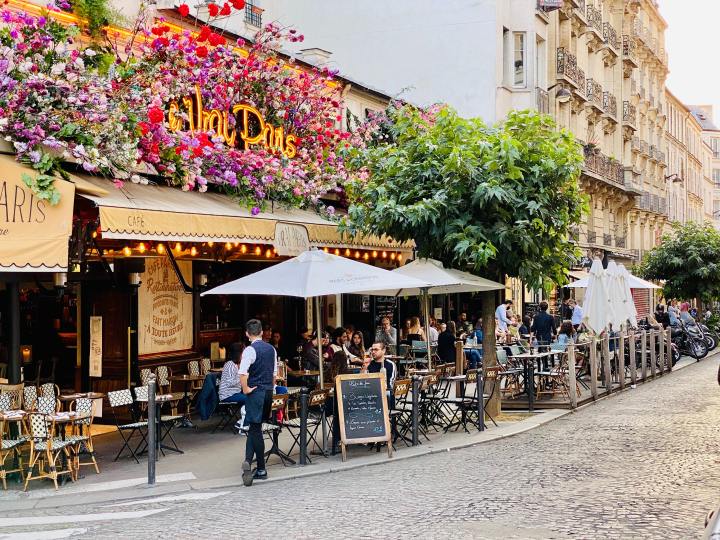
Eating out in France, after nine months of travelling on three continents, can be quite a rude homecoming. The food is as fabulous as ever, but l’addition – the bill – makes you really appreciate all those restaurants you visited in other countries.
For our first restaurant meal back in France we went to a traditional Parisian brasserie, nothing pretentious or trendy, just one of those places that have been preparing the same old-fashioned dishes for more than a century. Beef stew from Burgundy, andouillette and boudin (tripe sausage and blood sausage), snails and foie gras, choucroute from Alsace, you get the drift. We missed these simple carnivorous delights in all the fancy fusion restaurants we frequented elsewhere.
We wanted to be surrounded by middle-aged male waiters wearing black bow-ties and long white aprons, performing that typically Parisian ballet between tables, balancing trays on their palms and treating customers with haughty disdain.
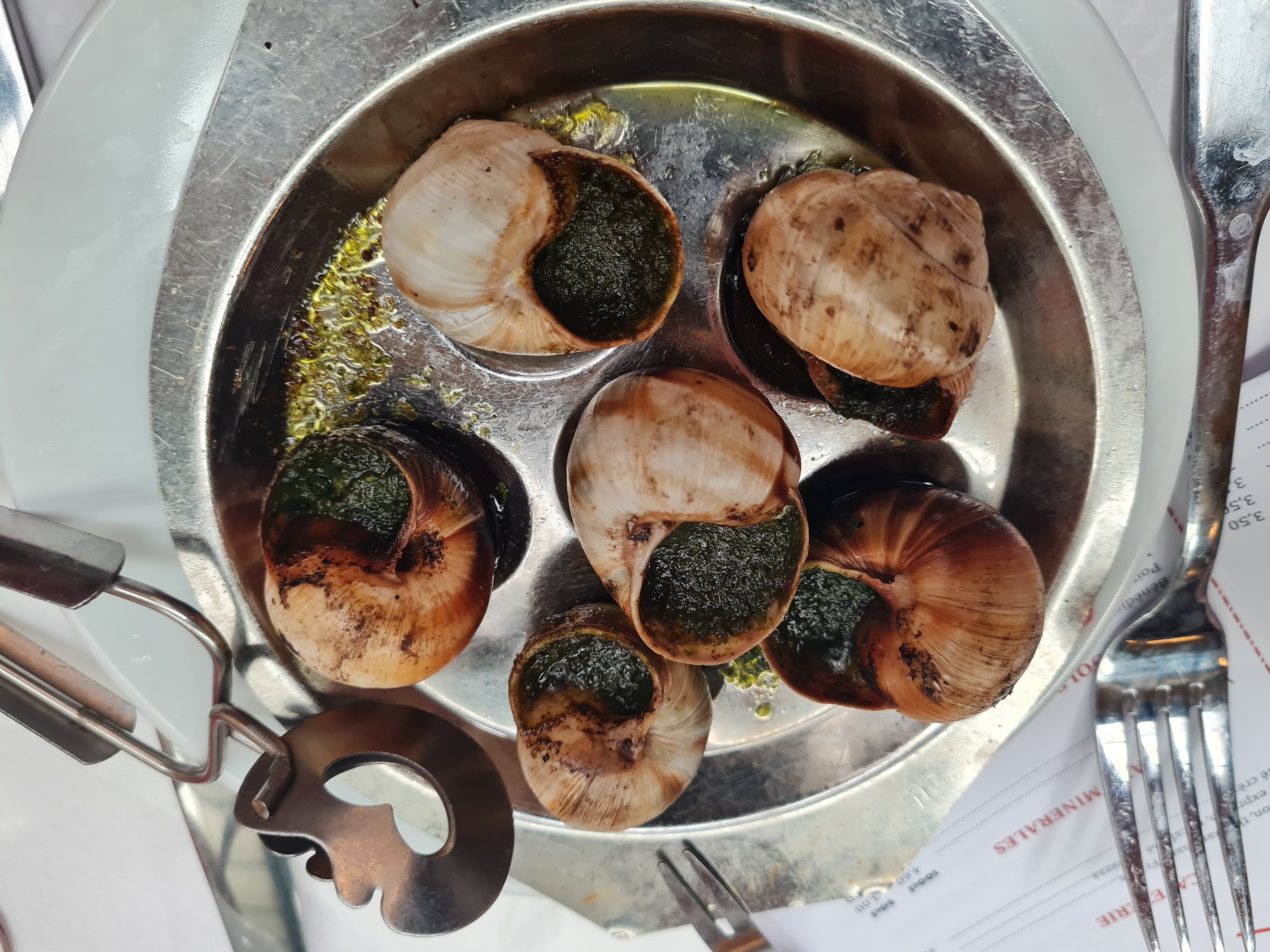
Snails as a starter in a Parisian brasserie. (Photo: Marita van der Vyver)
We actually missed those patronising Parisian waiters too.
You can only face so many over-familiar and motherly American waitresses, or gushing young South African waitrons writing love letters on your bill in a desperate attempt to solicit a decent tip, before you start yearning for unsmiling French professionalism again.
What a shock it was to realise that even Parisian waiters were smiling nowadays. As unexpected as Greta Garbo laughing in a movie, deserving the same kind of banner headlines: Waiters laugh! They make jokes with customers! Possibly yet another side-effect of Covid-19. During the long months when all restaurants were closed, even the stoniest of stone-faced waiters must have missed their customers. At least sometimes?
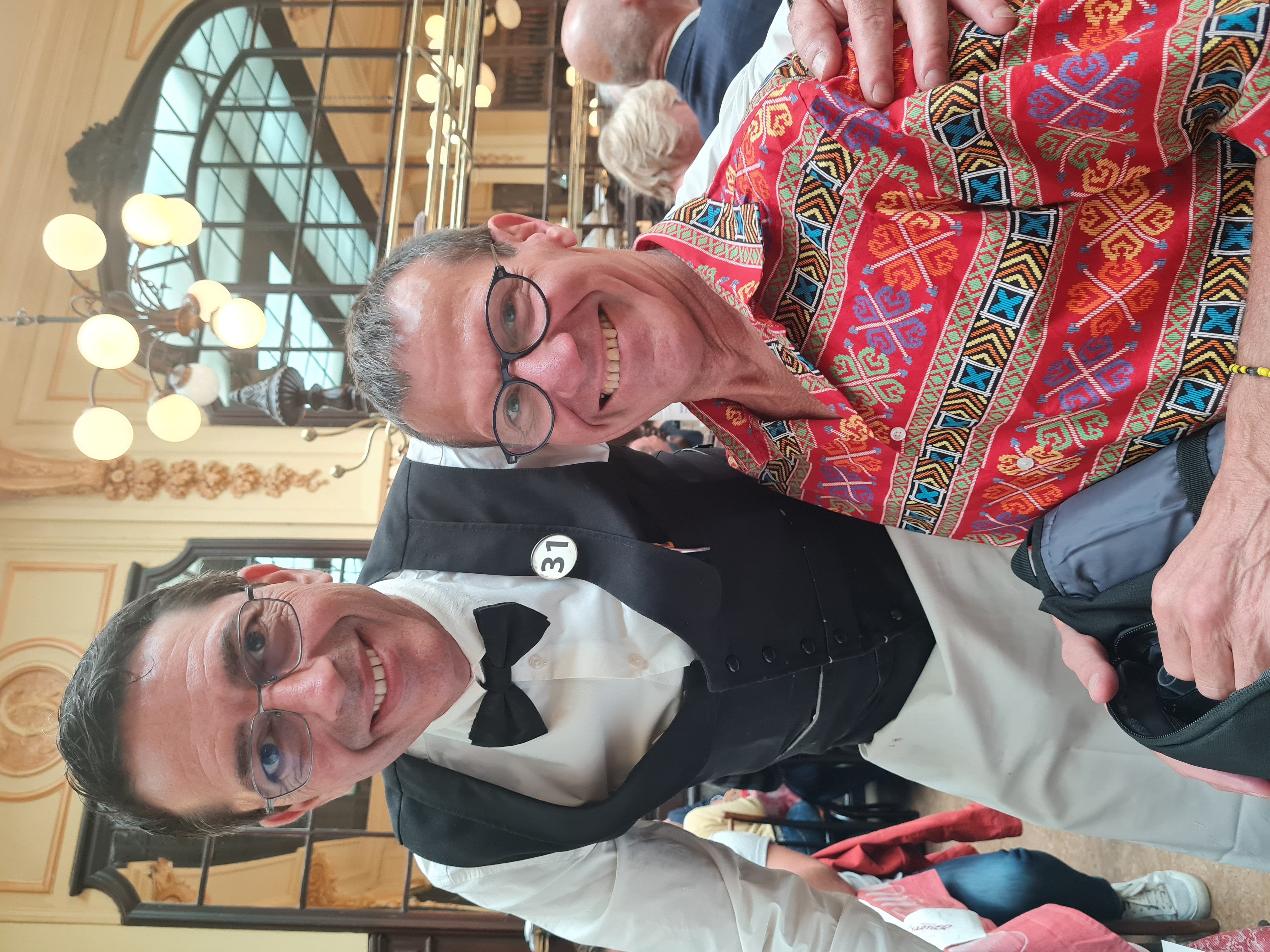
Christophe the Friendly Waiter at Bouillon Chartier. (Photo: Marita van der Vyver)
Anyway, we ended up in Bouillon Chartier in the 9th arrondissement, mainly because of fond memories of long-ago meals with friends from distant shores, and our waiter made us laugh out loud when we inquired about vegetarian options for our daughter who dined with us. “Vegetarian?” Christophe deadpanned. “What’s that?” Before bending closer to my ear to stage-whisper his condolences: “You know, Madame, we have beautiful meat dishes…”
I had mistakenly assumed that the menu would have been slightly adapted to changing culinary trends in the decade since I’d last been there. I’d thought there would at least be some vegetarian choices as starters. Obviously I hadn’t quite grasped that brasseries like these could last for more than a century exactly because they did not change. Not even slightly.
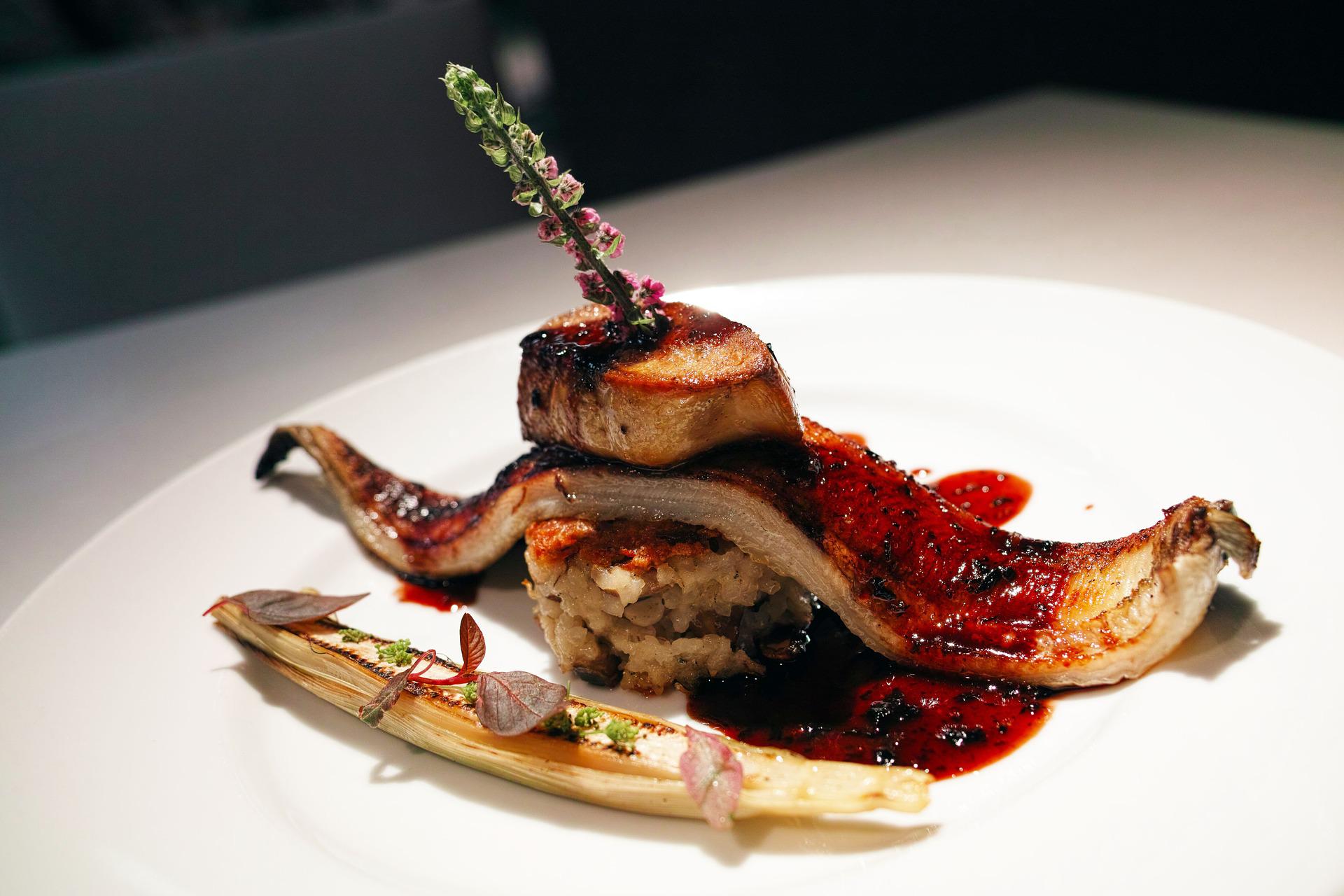
Foie gras finishes off an elegantly plated dish. (Photo: takedahrs on Pixabay)
Fortunately our daughter eats fish, because that was the closest she got to a non-meat choice.
Even more fortunate is that her boyfriend, like her father, loves red meat. The two men at our little table were hilariously happy with the menu. Just like his grandmother’s boeuf Bourguignon, the boyfriend exclaimed. The daughter declared that the fish was okay. I ordered the only other main dish without red meat, the rather boring poulet frites, and found the farm chicken tasty though a bit tough. I have no idea what the frites tasted like because they were scooped up by the boyfriend and the father.
And the smiling waiters weren’t the biggest shock of the day. More jolting – particularly when you flew in from South Africa where a fifth wave of the pandemic seemed to be hitting every single one of your friends who’d managed not to fall ill in the previous two years – was that all the Covid-19 restrictions had been lifted.
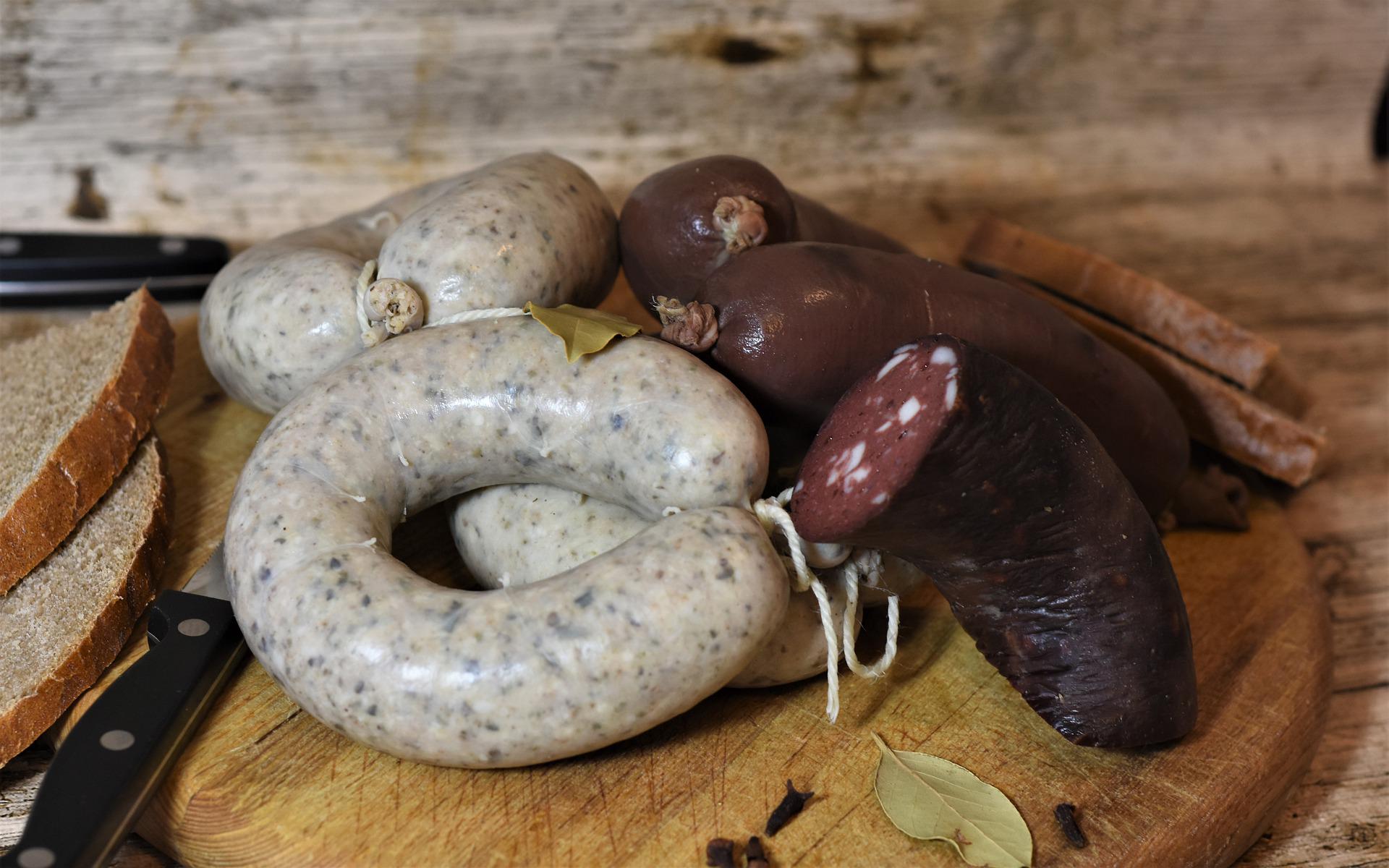
Boudin (blood sausage). (Photo: RitaE on Pixabay)
Just in time for the local elections this month, cynics have been remarking. Too soon, too sudden, critics are complaining. However, most of the restaurants that survived the pandemic are operating full-throttle again. No vaccination certificates required, no body-temperature testing, no social distancing, no masks, nothing.
I was as unprepared for this new kind of liberty as a prisoner unexpectedly released after decades behind bars. So this is what life used to be like, I have to keep reminding myself. Downright weird.
Yet the biggest shock of all, when you eat in a Paris restaurant after three months in South Africa and a fortnight in Greece, is the bill that the (still adamantly smiling) waiter brings at the end of the meal. L’addition, as it is called in French. This adding up is traditionally done right there on your paper tablecloth among fresh stains of food and wine.

A waiter en route to charming his diners. Perhaps. (Photo: Jill Fulton on Pixabay)
I was immediately reminded of why I eat out so rarely in la belle France, and so regularly in my birth country. A few euros can buy a lot of rands, and therefore a perfectly enjoyable meal in and around Cape Town. If you leave the city to explore the culinary delights of the countryside, your euros stretch even further.
In Greece you pay in euros, of course, but you do get a lot more value for your eating-out money than in France. On the island of Lesbos, where we treated ourselves to a restaurant meal almost every other day, we were constantly pleasantly surprised, sometimes plain astonished, by the bill at the end of the meal.
There are many reasons for the high price of eating out in France, some of them indeed laudable. Service charges are always included on the bill, and waiters earn a decent salary, unlike South Africa where most waiters have to survive on the tips they earn. If you do tip a French waiter, he has to share the tip with everyone else working in the restaurant – not only the other waiters but also the kitchen staff – so there is no incentive for waiters to be ingratiatingly subservient to customers.
Which probably also explains the infamous unfriendliness of Parisian waiters.
My South African-born son, who started working as a waiter during his school holidays in France, soon realised he was the only one being tipped by foreign customers. Because he spoke perfect English, because he had a charming smile and a witty way with words, because he treated everyone with respect and kindness. And night after night he had to share these earnings with his unsmiling and less efficient co-workers. This didn’t deter him from smiling, but it did make him question a working environment where mediocre service gets rewarded in the same way as excellent service.
French restaurants are also expensive because they are taxed relatively highly – but the other side of the coin is that the government gave restaurant owners substantial financial support during the past two years of Covid restrictions, the kind of help most South African restaurant owners could only dream of. Although many French restaurants stayed open by offering takeaway meals or home deliveries, numerous owners found the government’s aid generous enough to allow them to close their doors and ride out the pandemic at home.
But then again, the French government couldn’t afford not to help the country’s chefs and restaurants survive this troubled period. French cuisine is still the proud grandmaman of the international restaurant industry. The country’s honour was at stake, no less.
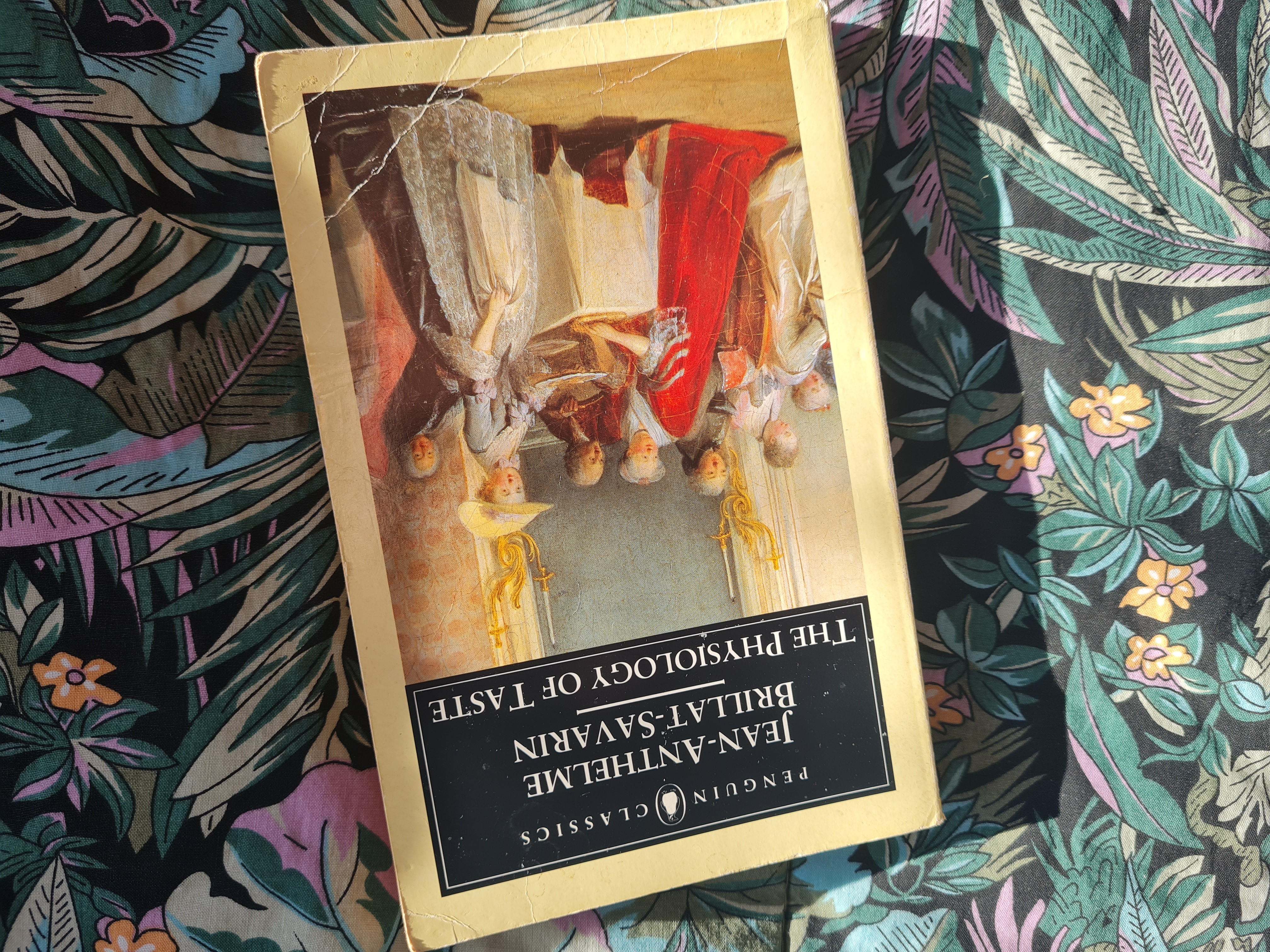
My well-read copy of Brillat-Savarin’s famous book. (Photo: Marita van der Vyver)
Paris is not only the seat of some of the oldest restaurants in the world, but there was a time when most of the famous chefs all over the world were French. And then there were the food writers who spread the fame of French cuisine; the brilliant lawyer Brillat-Savarin whose Physiology of Taste was first published in 1825 and has never been out of print; the esteemed chef Auguste Escoffier’s A Guide to Modern Cookery (1903); and Prosper Montagné whose seminal work became more famous than its author. Today every foodie would at least have heard of the encyclopaedic Larousse Gastronomique, published in 1938, but many won’t recognise Montagné’s name.
(Maybe there is a lesson in there for any writer of any genre: What you write is finally much more important than who wrote it.)
Most of the renowned non-French food writers of the past century also owed their culinary awakening to a prolonged stay in France: MFK Fisher, Elizabeth David, Julia Child who famously stated: I was 32 when I started cooking. Up until then, I just ate.
This is the back story of every addition in every French restaurant. This is of course why we are willing to pay more for an eating-out experience in France than in other countries. We know we are not only paying for what we get served, we are also paying for the long and illustrious culinary story behind what we get served.
Or that is how I console myself now that I’m travelling through my adopted country again, occasionally feeling as alienated as Odysseus after his return to Ithaca. I know we’ll keep going to restaurants, not as often as in South Africa or Greece, but we’ll keep exploring the art of eating out because that is part of what it means to live in France.
Later this week, for instance, we plan to go to Baba Yaga, a small restaurant in Lille where we won’t find anything traditionally French on the menu. We’ll go because it is owned by two women, one Russian and one Ukrainian, and they serve delicious Russian-Ukrainian dishes. And while there’s a war raging between these two countries, their little restaurant seems like a haven of peace and possibility.
Our travels have taught us that there are many reasons for eating out, and only when you add up all these reasons do you get the true addition of your meal. Which sometimes has nothing to do with money. DM/TGIFood
Follow Marita van der Vyver on Instagram Faking French.
The author supports Ladles of Love, an NGO feeding the hungry and providing healthy food in Cape Town. You can support them here Ladles of Love.





 Become an Insider
Become an Insider
The suspense is killing me … How much was it???